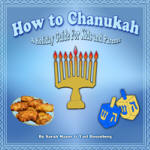
|
| • Holiday Gifts |
| Holiday Central > Rosh Hashanah > Torah Reading |
Rosh Hashanah
Torah Reading
By: Rivka C. Berman, Contributor
Click Here for More Holiday Articles

|
CHILDREN'S BOOK for AGES 5-11 |
First Day of Rosh Hashanah
Mazor Guide to Rosh Hashanah brings you much more about the holiday, its
meaning and its traditions... See the links below.
Articles
Isaac’s miraculous birth is the focus of the reading. Several themes
emerge from the account that relate to the modern Rosh Hashanah
experience.
“And God remembered Sarah” (Genesis 21:1) God remembered the promise
made to Sarah and she conceived.
God should remember us and deliver goodness in the year to come. This
reading speaks to the listeners and, it is hoped, to God. Remember us
like You remembered Sarah. How is that Sarah merited miraculous
infertility treatment? In the verses that come before the Rosh Hashanah
reading Sarah opened her home to and fed three total strangers. What do
we do for others?
Isaac’s birth to a woman as old as Sarah was a miracle, as miraculous as
the existence of the Jewish people. Any logical, thinking reasonable
person with a basic knowledge of Jewish history would have to conclude
that the Jewish people should have long ago joined the dodo bird in
extinction. But here we are!
Later in the Rosh Hashanah reading, Ishmael and Hagar are cast out. What
very, very politically incorrect passages to include in the High Holiday
service. In some synagogues these parts are censored. (Other synagogues
choose to read about the world’s creation from first chapter of Genesis
instead.)
To rectify the apparent cruelty of Ishmael and Hagar’s banishment, some
Jews enact a reconciliation ceremony between the descendants of Isaac
and Ishmael/Sarah and Hagar (today’s Jews and Arabs).
Yet, on the proverbial other hand, there are a few midrashim that
explain Sarah’s motives. Sarah may have witnessed Ishmael brutalizing
her son Isaac and ordered Ishmael’s expulsion to protect her son. How
far are we willing to buck convention for our families?
Another lesson can be learned from the verse that states, “Don’t fear,
Hagar, because God hears [Ishmael’s] voice from where he is” (Genesis
21:17). Prayer after prayer asks God for a good year. What chutzpah! Our
faults are so many how dare we even try to talk to God. But like Ishmael
God hears us from wherever we are, whatever state we’re in.
First Day’s Haftarah
Verses read from the prophets amplify themes from the Torah reading.
Just as Sarah was remembered by God and bore a child, Chana, who had
struggled with infertility for years and had her miseries compounded
taunting from Penina, her husband’s other very fertile wife, prays and
gives birth to Samuel. (He would grow up to be Samuel the Prophet.)
Unlike Sarah to whom angels appeared to bring the good new of her
upcoming pregnancy, the verses suggest that Chana’s prayers causes the
floodgates of blessing to open.
Later sages picked apart to understand why Chana’s prayer s were so
effective. We pray our prayers will be answered like Chana’s were.
Second Day of Rosh Hashanah
Torah Reading
Picking up on the narrative from the first day, the second day’s reading
recounts the binding of Isaac. God tests Abraham to make the ultimate
sacrifice. “Take your son, your only son Isaac, who you love” (Genesis
22:2) says God and commands a frightening journey to a mountain. After
recounting three days journey into the wilderness the narrative becomes
stark and haunting.
“And Isaac said to Abraham his father, ‘Dad?’
“And his father said, ‘Here I am, my son.’
“And Isaac said, ‘Here is the fire and the wood [for the sacrifice] but
where is the sheep?’”
Abraham builds the altar. Scripture gives no clue about Abraham’s
emotional state.
Abraham ties his son down to the altar. And raises the knife.
“And an angel called out to Abraham from heaven and said, ‘Abraham,
Abraham’
“And he said, ‘Here I am’
“And the voice said, ‘Lay not your hand upon the boy, nor do anything to
him!’”
In the nick of time Isaac is saved.
How this episode resonates with Rosh Hashanah’s message depends on how
you want to view it.
Take one: Abraham’s willingness to give up everything for God blazed a
trail for all Jews to follow. Abraham gave up his home and homeland at
God’s command. He was ready to give up his son as well when Abraham
could have easily and understandably refused God’s command. Abraham was
a man of the desert, a warrior, a man of means, he wasn’t desperate for
salvation; he didn’t have to follow God’s word. Abraham could have heard
God’s command to sacrifice Isaac and said, “That’s nuts. No way. Forget
it.”
But he didn’t.
Generations of Jews were tormented for their beliefs could have said.
“This is nuts. Forget it.” And they could’ve understandably succumbed
and converted, but they didn’t. They remained true to a higher truth and
to their convictions. We celebrate this strength of character by reading
the Binding of Isaac and pray that Abraham and Isaac’s incredible belief
in God’s righteousness will help us merit a sweet new year.
Take two: Abraham and Isaac’s devotion to God is said to bring extra
bonus points for all Jews because at this moment Abraham became a
conscious, conscientious follower of God. When God sends the angel to
stop Abraham from slaughtering his son, God is taking Abraham and
shaking him by the shoulders. Abraham epitomized kindness and
overflowing love. (He even bargained with God to save the sinners of
S’dom.) Blindly binding his son onto an altar was an act Abraham should
have been conscious of and objected to, but he was following God and
thus asked no questions, posed no challenges. The joy of being Jewish is
the legacy of standing against the tide of questionable judgment.
Perhaps Jews inherited the spiritual genes of righteousness and
chutzpah, questioning the “it” idea and even God, from this moment on
Mt. Moriah.
Second Day’s Haftarah Reading
The reading from Jeremiah is a love song from God to the Jewish
people. On Rosh Hashanah, when Jews turn to God as Supernal Parent, God
pledges to love the Jewish people like a parent loves a wayward child.

.jpg)
Buy Kosher Wines for Rosh Hashanah!!
|
|
|
|

|
| • Holiday Gifts |
|
|
 |
| • Celebrations Gifts |
|
·
Wedding Gifts · Bar Mitzvah Gifts · Baby Gifts · Jewish Books at Great Prices |
KOSHER BY DESIGN Amazing New Kosher Cookbook. BUY |
Mazor Guides: Wealth of Information and Resources
- Mazor Guide - The Ultimate Guide to
Living Jewish -
- Guide to Jewish
Holidays -
-
Bar Mitzvah
and Bat Mitzvah Guide -
-
Guide to a
Jewish Wedding -
-
Guide to Jewish Celebrations -
-
Guide to Kosher Living -
- Infertility and
Judaism: A Guide -
- The Get (Gett)
- the Jewish Divorce: A Guide -
- Zei
Gezunt: Jewish Perspective on Health -
- Jewish Genetic Diseases -
-
Death and Mourning in
Judaism -
Copyright 1998-2024 MazorNet, Inc.
| http://www.MazorGuide.com | http://www.MazorBooks.com | http://www.Kosher-Directory.com | http://www.JewishCelebrations.com



